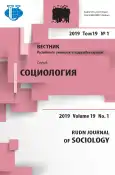Addis Ababa master development plan: A program for development or for ethnic cleansing?
- Authors: Aberra D.1
-
Affiliations:
- Addis Ababa University
- Issue: Vol 19, No 1 (2019)
- Pages: 31-39
- Section: Contemporary society: the urgent issues and prospects for development
- URL: https://journal-vniispk.ru/2313-2272/article/view/340340
- DOI: https://doi.org/10.22363/2313-2272-2019-19-1-31-39
- ID: 340340
Cite item
Full Text
Abstract
It is the legitimate authority of states to prepare and implement development plans. In the democratic society, preparation and implementation of development plans necessarily imply consultations and consent of the local communities affected by the development plan. Such plans should not be unilaterally prepared and coercively imposed on local communities. Any imposed development plan is incompatible with fundamental human rights and freedoms. Thus, the article aims at identifying whether or not the so-called ‘Addis Ababa Integrated Master Plan’ is a true and elaborate development plan. A real development plan ensures that the intended development project does not result in destruction of the livelihoods and cultural integrity of the local communities living in the project area. The author also considers possible explanations for the Ethiopian Government’s refusal to listen to the continuous protests of the Oromo people against the ‘Addis Ababa Integrated Master Plan’. In the particular context of regional development aiming at the hidden ethnic cleansing, the intent to destroy a certain group’s cultural identity cannot be declared openly by the government but it can be seen in the relevant long-term policies, governmental patterns of actions and facts of everyday life. The article examines from the historical perspective the long-term successive Ethiopian governments’ policies and relevant facts to reveal the state’s intent to destroy the Oromo identity in Addis Ababa and its suburbs. If the Oromo are evicted from the ancestral land their economic life, social networks, language, cultural traditions and norms will be destroyed, and the Oromo in the area of the ‘Addis Ababa Integrated Master Plan’ will eventually disappear as a cultural group with a distinct ethnic identity.
About the authors
Degefa Aberra
Addis Ababa University
Email: kaberra@yahoo.com
кандидат социологических наук, доцент юридической школы Университета Аддис-Абебы P.O. Box 1176, Addis Ababa, Ethiopia
References
- Abba Antonios Albertos. The Apostolic Vicariate of Oromo [Galla], A Capuchin Mission in Ethiopia (1846-1942). Addis Ababa; 1998.
- Alamaayyoo Haayilee. Sirna Gadaa Siyaasa Oromoo Tuulama. Finfinnee; 2007.
- Benti Getahun. Addis Ababa: Migration and the Making of a Multiethnic Metropolis, 1941-1974. Asmara; 2007.
- Davidson L. Cultural Genocide. New Brunswick; 2012.
- Draft Convention on the Crimes of Genocide, UN ESCOR. UN Document E/447(1947).
- Eshetu Erena. Ye Oromo taarik kaxint iske 1890 wochu macarasha. Finfinnee; 2009.
- Holocomb, Sisay Ibsa. Invention of Ethiopia: The Making of Dependent Colonial State in Northeast Africa. Asmara; 1990.
- Kingston L. The destruction of identity: Cultural genocide and indigenous peoples. Journal of Human Rights. 2015; 14.
- Lemkin R. Axis Rule in Occupied Europe. Washington; 1944.
- Markakis J. Ethiopia. The Last Two Frontiers. Woodbridge; 2011.
- Merera Gudina. Ethiopia: From Autocracy to Revolutionary Democracy: 1960s-2011. Addis Ababa; 2011.
- Morsink J. Cultural genocide, the Universal Declaration, and minority rights. Human Rights Quarterly. 1999; 21 (4).
- Moses A.D. Empire, colony, genocide: Key words and the philosophy of history. Empire, Colony, Genocide, Conquest, Occupation, and Subaltern Resistance in World History. New York; 2009.
- Nersessian D. Rethinking cultural genocide under international law, human rights dialogue: Cultural rights. http://www.carnegiecouncil.org/publications/archive/dialogue/2_12/section_ 1/5139.html.
- Pankhurst R. State and Land in Ethiopian History. Addis Ababa; 1966.
- Roos S.R. Development genocide and ethnocide: Does international law curtail development induced displacement through prohibition of genocide and ethnocide? Center for Human Rights and Humanitarian Law. 2002; 9 (3).
- Silina E. Genocide by attrition. International Affairs Working Papers. San Francisco; 2008.
- Strauss S. Contested meanings and conflicting imperatives: A conceptual analysis of genocide. Journal of Genocide Research. 2001; 3 (3).
- Tinker G.E. Missionary Conquest: The Gospel and Native American Cultural Genocide. Minneapolis; 1993.
- Tronvoll K. War and the Politics of Identity in Ethiopia: The Making of Enemies and Allies in the Horn of Africa. New York; 2009.
- Vaughan S., Tronvol K. (2003). The Culture of Power in Contemporary Ethiopian Political Life. Sida Studies; 2003.
- Veracini L. Settler Colonialism: A Theoretical Overview. London; 2010.
- Wolfe P. Settler colonialism and the elimination of the native. Journal of Genocide Research. 2006; 8 (4).
Supplementary files









